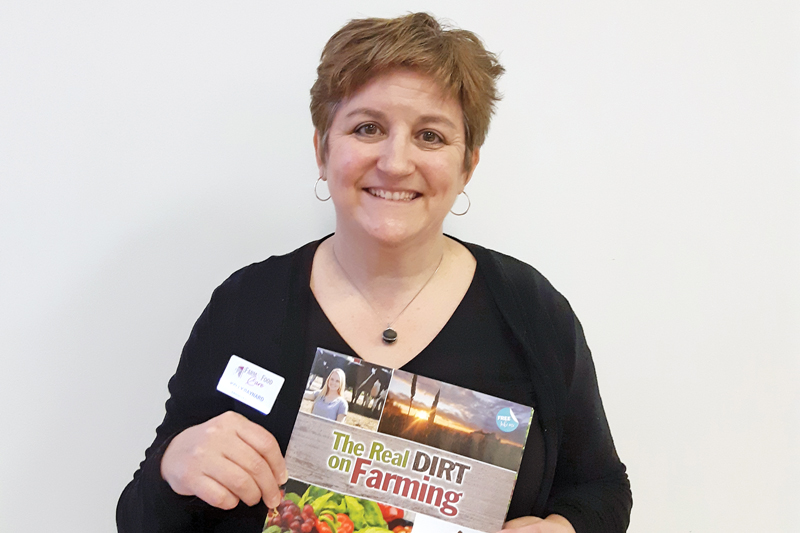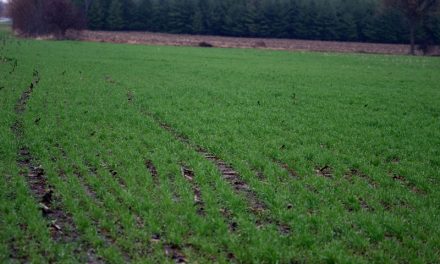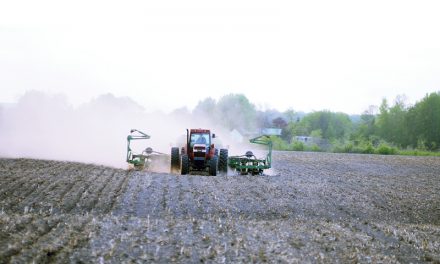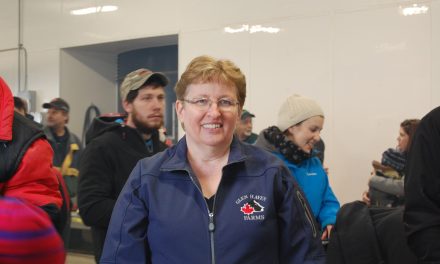Educating the right way
Kelly Daynard, executive director of Farm & Food Care Ontario led a Speak Up for Agriculture workshop in Chesterville on Feb. 26. About 30 agricultural advocates from across Eastern Ontario attended to learn more about the best practices of explaining agriculture to the public. Whalen photo
CHESTERVILLE – With farmers currently representing less than two per cent of the Canadian population, there are fewer and fewer people to tell the story of where food comes from and how it is produced. Farm & Food Care Ontario (FFCO) stopped by Chesterville on Feb. 26 to engage and guide about 30 local ag-advocates in the art of telling the farm story at their Speak Up for Agriculture workshop, sponsored by the Ottawa Valley Seed Growers Association.
“Consumers are confused by all of the information out there and don’t know who to believe,” says Kelly Daynard, executive director of FFCO. “They don’t want to be lectured to, they just want to have a conversation with someone who can answer their questions about food and farming. We find that by providing them with a great experience, like a Breakfast on the Farm, they get a chance to meet a real farmer, have a quick conversation and they’ll leave with a more positive attitude.”
Farmers tend to be a pragmatic bunch, and to many, storytelling means reciting a chronology of what goes on, how it’s done and likely outcomes. Instead, Daynard encourages telling the farm story by emphasizing the benefits to consumers and offering likenesses they can relate to, to assist with understanding. For example, some people don’t like that cows are tied in stalls. However, people tie their children into strollers. The reasons for restraining both the cows and the children are the same; to keep them safe and comfortable.
Don’t start out defensive, Daynard encouraged because you may be the first real farmer they have ever met, and they likely just want to get the answer to a question that has been on their mind.
“A lot of the conversations we have in Canada come from a place of privilege,” explained Daynard. “We have so many food choices here – think of how many different kinds of eggs are on the grocery shelves – and so many consumers with a lot of disposable income. Conversations like the ones we have in Canada don’t happen in countries where there isn’t enough food.”
Another issue producers face is companies capitalizing on negative food labels. “Many companies are now selling things based on negative marketing, such as GMO-free. That label appears on so many things where there isn’t a GMO version anyway, such as kitty-litter, salt and Triscuit crackers, among others. And then the “hormone free” campaign too – on things like eggs and milk where added hormones have been banned for 50 plus years,” explained Daynard.
“Likewise, with the label phrase “free and natural”. What does that even mean? “Free and natural” can apply equally to anything from butterflies to Ebola,” said Daynard. “People don’t know where to get their answers – and bad news sells, so that is often all they hear. We need to change the dialogue. We need to tell our story of agriculture.”
When discussing farming with a non-farmer, a great place to start is to identify some common ground. Consumers want healthy, affordable, safe food that is environmentally friendly and respectful of animal welfare. That’s easy! Farmers want the same thing! In the words of Theodore Roosevelt, “No one cares how much you know, until they know how much you care.” So, show the non-farming public how much you care.
Among the participants at the Speak Up for Agriculture workshop were Bruce and Liz Hudson, along with their daughter Kerin. The Hudsons have a 200-sow farrow-to-finish operation on about 1,200 acres near Kinburn and also market garden about 45 acres of sweet corn, potatoes, beans and beets.
Bruce found the workshop to be “a good refresher and reminder of some of the dos and don’ts of speaking with the public.” Liz manages the market garden end of the business and deals with the public regularly. She appreciated the workshop information saying, “Through the market gardening, I talk to the public often, but only for short periods of time, so I am always looking for tips. This has been great.”
The first time Kerin heard Kelly Daynard speak was when she was in 4-H and saw a presentation on The Real Dirt on Farming. “Kelly had such valuable tips to share. It’s exciting to be with people who are passionate about where they live and work,” she said.
Farm & Food Care Ontario has a wide array of resources to help farmers tell their positive stories about agriculture. For more information please visit www.farmfoodcareON.org.













